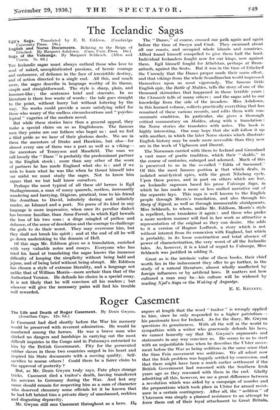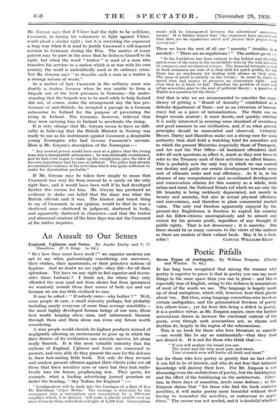Roger Casement
The Life and Death of Roger Casement. By Denis Gwynn. (Jonathan Cape. 12s. 6(1.) IF Casement had died shortly before the War his memory would be preserved with reverent admiration. He would be numbered among the heroes. He was a brave man who shirked no dangers and hardships in carrying out the most difficult inquiries in the Congo and in Putumayo entrusted to him by the British Government. Pity for the persecuted rubber slaves in those two countries surged in his heart and inspired his State documents with a moving quality. Self- sacrifice to rescue others Could there be a fairer claim to the approval of posterity ?
But, as Mr. Denis Gwynn truly says, Fate plays strange tricks. Casement died a traitor's death, having transferred his services to Germany during the War. And lest any cause should remain for respecting him as a man of character who deserved clemency some officials let it be known that he had left behind him a private diary of unashamed, reckless and disgusting depravity.
Mr. Gwynn still sees Casement throughout as a hero. He
argues at length that the word " traitor " is wrongly applied to him, since he only responded to a higher patriotism— his passionate love for Ireland. As for the diary, Mr. Gwynn questions its genuineness. With all the will in the world to sympathize with a writer who generously defends his hero, we cannot honestly say that Mr. Gwynn's arguments and statements in any way convince us. He seems to us to start with an unjustifiable bias when he describes the Ulster move- ment before the War as being seditious in the same sense that the Sinn Fein movement was seditious. We all admit now that the Irish problem was happily settled by concession, and that there might have been a much earlier settlement if the British Government had reasoned with the Southern Irish years ago as they reasoned with them in the end. Gladly admitting all this, however, we see a great difference between a revolution which was aided by a campaign of murder and the preparations which took place in Ulster for armed resist- ance in a certain contingency. After all, the " sedition " of Ulstermen was simply a planned resistance to an attempt to force them out of their loyal attachment to Great Britain. Mr. Gwynn says that if Ulster had the right to be seditious, Casement, in raising his volunteers to light against Ulster, could plead a similar right ; but it is stretching the argument a long way when it is used to justify Casement's self-imposed mission to Germany during the War. The motive of every patriot may be pure in the sense that he believes himself to be right, but when the word " traitor " is used of a man who transfers his services to a nation which is at war with his own country the word is undoubtedly used in its ordinary sense. Yet Mr. Gwynn says "to describe such a man as a traitor is FL strange misuse of words."
As a matter of fact, Casement in the ordinary sense was doubly a traitor, because when he was unable to form a brigade out of the Irish prisoners in Germany—the under- standing that the brigade was to be used solely to help Ireland did not, of course, make the arrangement any the less pro- German or anti-British—he accepted a passage in a German submarine to Ireland for the purpose of preventing the rising in Ireland. The Germans, however, believed that they were carrying him to Ireland to accelerate the rising.
It is very strange that Mr. Gwynn seems to have no diffi- culty in believing that the British Minister in Norway was ready to use as his instrument against Casement a despicable young Norwegian who had become Casement's servant. Here is Mr. Gwynn's description of the Norwegian :—
" Any normal person would have seen at a glance that the young man was a disreputable adventurer ; he was idiotically overdressed, and he had even begun to make up his complexion, once the idea of his own importance had become so inflated. The police had already accumulated evidence of his activities which was quite sufficient to make his deportation probable."
If Mr. Gwynn may be taken here simply to mean that Casement was very far from normal he is surely on the only right lines, and it would have been well if he had developed further this excuse for him. Mr. Gwynn has produced no evidence to shake our belief that the diary was what the British officials said it was. The kindest and truest thing to say of Casement, in our opinion, would be that he was a shattered man—shattered in judgment, shattered in body, and apparently shattered in character—and that the traitor and abnormal creature of the later days was not the Casement of the rubber inquiries.











































 Previous page
Previous page